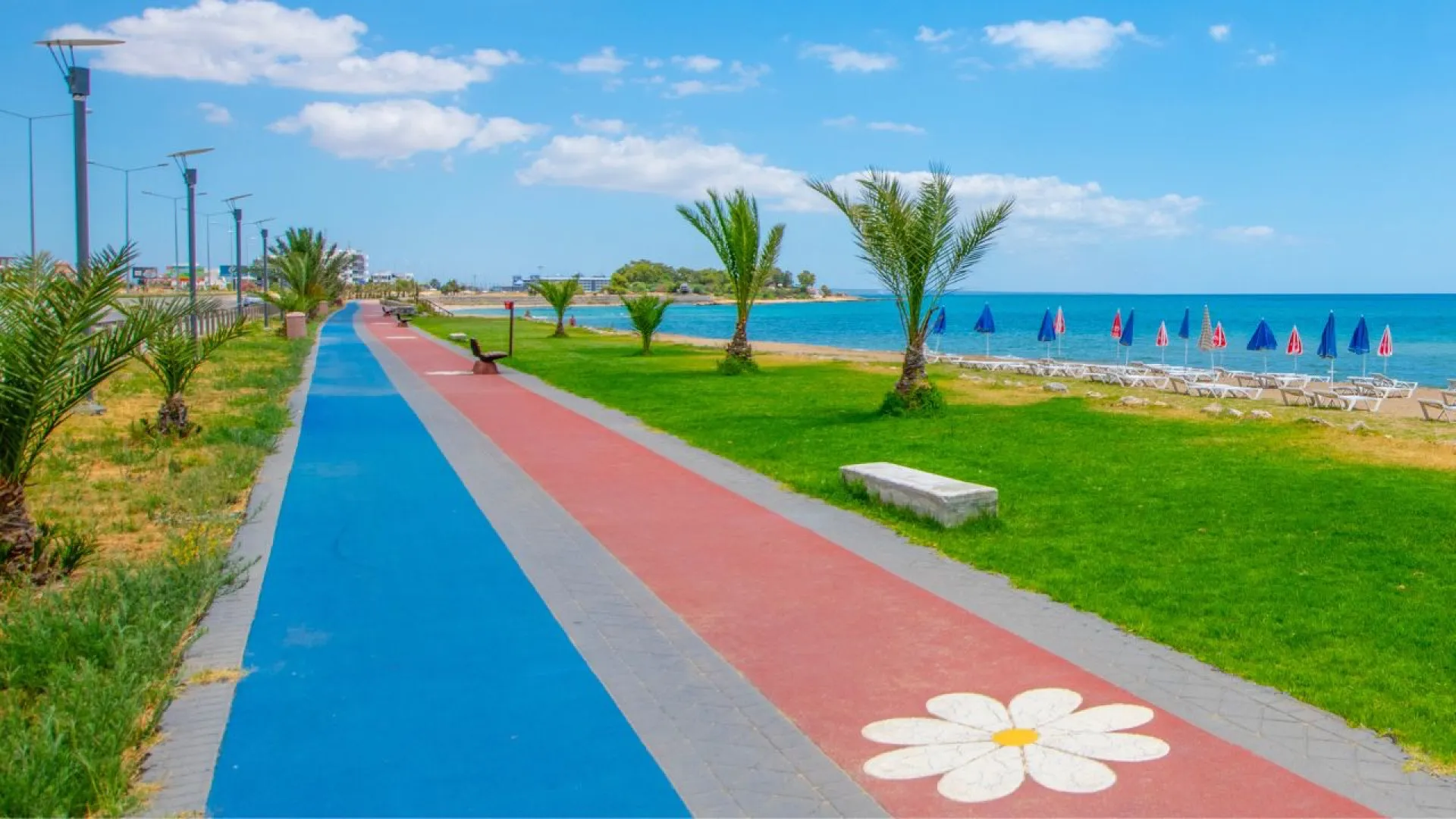




When you choose a long-term stay in Cyprus, you’re often doing so out of a desire for change—whether it’s for professional reasons as a digital nomad, personal growth as an expat, or simply for an extended break from the daily grind. This decision to start a new chapter on the sunny island brings with it a unique opportunity: the chance to cultivate a more conscious, sustainable lifestyle. The island, with its breathtaking nature and finite resources, inspires you to rethink your way of living. Sustainable living in Cyprus means not only protecting the environment but also connecting more deeply with the local culture and community. It’s about being a positive contributor, not just a consumer.
In this article, you will learn how to align your long-term stay in Cyprus with environmental consciousness. We’ll explore practical tips and inspiring ideas, from sustainable shopping and eco-friendly transportation to mindful consumption. Instead of just being a visitor, you will become part of the solution. This will make your stay a fulfilling experience that not only enriches you but also gives something back to the beautiful island you call home. Take the first step toward a more eco-friendly island life.
The sun, the sea, and the breathtaking landscapes of Cyprus are the main reasons people are drawn to the island. But this beauty is fragile. Like many other tourist destinations, Cyprus is grappling with the challenge of plastic waste. Beaches and natural areas are often affected by litter, which not only mars the scenery but also threatens delicate ecosystems. As a long-term traveler and resident, you can make a big difference here. Mindful consumption is the first and most crucial step to reducing your ecological footprint and protecting the environment. It's an attitude that goes beyond a holiday and is reflected in every aspect of everyday living in Cyprus.
One of the easiest and most effective ways to avoid plastic is through conscious shopping. Supermarkets often offer products wrapped in unnecessary plastic, which contributes a significant portion of daily waste. However, those who live in Cyprus have fantastic alternatives. Take advantage of the local farmers' markets, which are held regularly in almost every city and many villages. Here, you can buy fresh fruits and vegetables directly from the producers, often with no packaging. Simply bring your own reusable bags and nets. It's not only an eco-friendly choice but also an opportunity to experience authentic interactions with locals and support traditional distribution channels.
In addition, bulk stores are gaining popularity in cities like Limassol, Nicosia, and Larnaca. These shops offer a wide range of staples, spices, oils, grains, and cleaning products in large containers. By bringing your own glass jars and bags, you not only reduce plastic waste but often save money as well, as you only buy the amount you truly need. This conscious shopping behavior is not just good for the environment; it also provides a unique way to connect with local producers and experience the authentic side of the Cypriot way of life.
A sustainable diet begins with understanding where your food comes from. Cypriot agriculture is rich in regional and seasonal products that are not only delicious but also environmentally friendly, as they don't have to travel long distances. By buying local fruits and vegetables like olives, citrus fruits, watermelons, and potatoes, you not only support the local economy but also reduce the carbon emissions caused by importing food from distant countries. The short journey from the field to your table also ensures the freshness and nutritional value of the products.
Beyond agriculture, there's a growing number of artisan producers on Cyprus who make traditional products—from cheeses like Halloumi and Anari to wine, honey, and olive oil. By purchasing these items directly from small producers at markets or in their small farm shops, you contribute to preserving the island's cultural heritage and supporting an economy based on quality and craftsmanship, not mass production. Such mindful consumption is a central pillar for a sustainable living in Cyprus.
For a truly sustainable life, it's essential to become familiar with the local waste management system. Cyprus's recycling system is constantly evolving and offers more and more ways to separate waste. Get to know your municipality's specific rules, as they can vary from town to town. In most cities, there are separate bins for plastic, paper, and glass, often found at central collection points. Some communities even offer curbside collection of recycling bags.
Another important aspect is composting organic waste, which makes up a large portion of household trash. If you have a garden or a balcony with plants, you can turn food scraps like fruit and vegetable peels into valuable compost. This not only reduces the amount of waste that ends up in landfills but also creates a natural fertilizer for your plants. By taking the time to understand and use these systems, you actively contribute to protecting the local environment and practicing an eco-conscious living in Cyprus.
Another crucial area where you as a long-term resident can make a positive impact is transportation. Cyprus is an island best explored by car, but that doesn't mean you can't make environmentally conscious choices. Your choice of transportation and energy consumption have a direct impact on the environment, particularly on air quality and CO₂ emissions. A sustainable living in Cyprus also means rethinking mobility.
While public transportation in Cyprus's rural areas is still developing, the larger cities like Limassol, Paphos, Larnaca, and Nicosia have well-established bus networks. For short distances within city centers, the bus is a convenient and eco-friendly alternative that helps reduce traffic congestion. If you rent a property close to a city center or a workplace, you can also cover many routes on foot or by bike. Many coastal towns have promenades and bike paths that are perfect for environmentally friendly travel. This not only saves on fuel costs but also promotes a healthy lifestyle.
For longer distances where a car is indispensable, you have the option of switching to a hybrid or electric vehicle. The market for electric cars is steadily growing in Cyprus, and the government offers incentives for their purchase, making the switch attractive. This is an investment that pays off in the long run, not only for your wallet through lower operating costs but also for the environment by reducing emissions. Also, consider car-sharing models or carpooling. Such initiatives are not only good for the environment but also strengthen the sense of community among long-term residents.
Cyprus has a dry, hot climate, which makes water and energy consumption a critical issue. Water resources are limited and must be used responsibly. A conscious approach to water starts with simple things: turn off the tap while brushing your teeth, catch water in a basin while you wait for it to heat up, and fix leaky pipes immediately. If you have a garden, water your plants in the early morning or late evening to minimize evaporation. These small changes in behavior can make a big difference cumulatively.
Electricity consumption, especially from air conditioning during the hot summer months, is also a significant factor. Here, there are numerous ways to save energy. Choose a home with good insulation and use shutters or blinds to keep the heat out before turning on the air conditioner. Turn off electrical devices when you're not using them and unplug them to avoid so-called standby consumption. The sun's radiation in Cyprus is intense almost all year round, making the island an ideal location for solar energy. Many homeowners and landlords already use solar panels for water heating. A conscious use of these resources is not only an ecological but also an economic advantage that defines a sustainable living in Cyprus.
Sustainability is more than just reducing plastic or electricity consumption. It's also about fostering a respectful relationship with the local culture and the island's unique nature. As a long-term resident, you have the opportunity to actively engage with the community and help protect Cyprus's natural treasures. This section shows you how to combine your living in Cyprus with social and ecological commitment. This is particularly important for retirees or individuals living alone who are looking for a way to make new connections and find purpose in their new home.
Cyprus is blessed with impressive biodiversity and natural beauty, from the rugged coastlines of the Akamas Peninsula to the dense forests of the Troodos Mountains. These areas are unique ecosystems that must be protected. When hiking, cycling, or exploring, you should always stay on marked trails. This not only protects the sensitive flora and fauna but also keeps you safe, as some areas can be hazardous. Avoid picking plants or removing stones, which can be important habitats for small animals. Appreciating nature is a key part of Cypriot culture, and by showing respect, you show locals that you care about their country.
Caution is also needed on the beaches, especially during the summer months. Cyprus is a vital nesting ground for sea turtles. Respect protected areas and follow instructions to avoid disturbing the nesting sites. Environmentally conscious behavior in nature also means not leaving any trash behind. Always carry a waste bag to collect your litter and perhaps even that left by others. Every small gesture helps preserve the island's beauty for future generations.
Another way to get involved is by participating in local environmental and conservation initiatives. There are various organizations in Cyprus that regularly hold beach clean-ups, tree-planting events, or educational campaigns. Volunteering for such projects is a fantastic way to meet like-minded people, network with locals, and have a direct, positive impact. For single retirees looking to settle into a new environment, such volunteer programs offer a structure and purpose that goes beyond daily routines.
Beyond conservation, there are numerous local communities and clubs. Many villages and towns have citizen initiatives or cultural associations that organize festivals, classes, or shared activities. By supporting these, you can immerse yourself in the local culture, learn the language, and become part of the social fabric. Cypriots are known for their hospitality and openness, and a willingness to get involved will open many doors for you. Support small, local businesses that value sustainability. This ranges from restaurants that source ingredients regionally to artisans who create their products from recycled materials. By shopping at these places, you help promote a circular economy and support the island's traditional craftsmanship. Through these choices, your living in Cyprus becomes a conscious and responsible experience.
The topic of housing is of central importance for long-term travelers and expats. In your living in Cyprus, you can make a decisive contribution to sustainability when choosing your accommodation. The island's real estate sector is constantly evolving and offering more opportunities to live eco-friendly. The right choice can not only minimize your ecological footprint but also lower your living costs.
When searching for a rental apartment or house, you should not only consider location and price but also ecological criteria. Many new buildings in Cyprus are built according to modern energy standards and have better insulation, which reduces the need for air conditioning in summer and heating in winter. Look for features like double glazing, solar panels for hot water, and energy-efficient household appliances. Solar energy is particularly advantageous in Cyprus, as the island enjoys over 300 sunny days a year.
If you rent a property in an older building, there are still ways to reduce energy consumption. Use energy-efficient lighting, utilize blinds and curtains to keep rooms cool, and turn off electrical devices completely instead of leaving them in standby mode. A conscious decision for an energy-efficient home is an essential aspect of sustainable living in Cyprus.
On an island with limited water resources, a conscious approach to water is of utmost importance. Look for leaky faucets and toilets that waste water unnecessarily. If possible, install water-saving showerheads and faucets. Another eco-friendly practice is collecting rainwater for watering plants or using greywater (e.g., water from the shower or washing machine) for flushing toilets, if the building is designed for it.
Waste disposal also plays an important role. While the recycling system in Cyprus may not be as comprehensive as in other European countries, many communities now have recycling containers for plastic, paper, and glass. Make it a habit to sort your waste and visit the recycling centers regularly. Many supermarkets and shops also accept old batteries and electronic devices for disposal. Sustainable living in Cyprus requires a high degree of personal responsibility and a willingness to make small but impactful behavioral changes.
Your long-term stay in Cyprus is far more than just a place to live—it's a chance to cultivate a lifestyle that is in harmony with nature and the community. Every conscious decision, from shopping at the local market to choosing your mode of transport, helps preserve the beautiful island for the future. By respecting the local culture and supporting conservation initiatives, you become an integral part of the Cypriot community. A sustainable living in Cyprus is not just a trend but a commitment that makes life on the island all the richer and more meaningful.
Are you ready to begin your new, sustainable life in Cyprus?
We use necessary cookies including analytics to ensure our website works properly and to understand how to improve your experience. By continuing to browse, you accept our use of necessary cookies. Click "Accept All" for personalized content and offers.